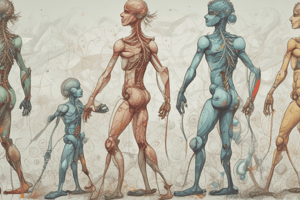Podcast
Questions and Answers
Why do populations evolve but individual organisms do not?
Why do populations evolve but individual organisms do not?
- Populations contain the collection of genes called the gene pool. (correct)
- Individual organisms lack genetic variation.
- Evolution only affects group behaviors, not individual traits.
- Mutation occurs in populations but not in individual organisms.
What is a gene mutation?
What is a gene mutation?
- A change in the population's gene pool.
- A permanent alteration in the DNA sequence of a gene. (correct)
- A temporary change in an organism's genetic makeup.
- A change in the genetic makeup of an entire species.
How does natural selection impact populations?
How does natural selection impact populations?
- It encourages mutations that are harmful to the population.
- It preserves all individuals within a population.
- It randomly selects individuals for survival.
- It removes less-fit individuals, allowing more-fit ones to survive. (correct)
Why are mutations considered a driving force of evolution?
Why are mutations considered a driving force of evolution?
What is the role of mutations in natural selection?
What is the role of mutations in natural selection?
What is the major difference between hereditary mutations and acquired mutations?
What is the major difference between hereditary mutations and acquired mutations?
What term is used to describe genetic changes that are present for the first time in one family member as a result of a mutation in a germ cell?
What term is used to describe genetic changes that are present for the first time in one family member as a result of a mutation in a germ cell?
Which type of gene mutation is responsible for normal differences between people like eye color and blood type?
Which type of gene mutation is responsible for normal differences between people like eye color and blood type?
What would happen if a de novo mutation occurs in the fertilized egg shortly after the egg and sperm cells unite?
What would happen if a de novo mutation occurs in the fertilized egg shortly after the egg and sperm cells unite?
Why are most disease-causing gene mutations considered uncommon in the general population?
Why are most disease-causing gene mutations considered uncommon in the general population?
Flashcards are hidden until you start studying
Study Notes
Mechanisms of Evolution
- A population evolves because of changes in the gene pool, which is the collection of genes in a population.
- Individuals in a population do not evolve; instead, the population as a whole evolves over time.
Mutation
- Mutation is a random change in an organism's genetic makeup that influences the population's gene pool.
- Mutations give rise to new alleles, which are a source of genetic variation in a population.
- Mutations can be harmful, benign, or beneficial, and they can affect the ability of organisms to survive and reproduce.
Types of Mutations
- Gene mutations are permanent alterations in the DNA sequence that makes up a gene.
- Mutations can range in size from a single DNA building block (base pair) to a large segment of a chromosome that includes multiple genes.
Hereditary Mutations
- Hereditary mutations are inherited from a parent and are present throughout a person's life in virtually every cell in the body.
- These mutations are also called germline mutations because they are present in the parent's egg or sperm cells.
Acquired Mutations
- Acquired mutations occur at some time during a person's life and are present only in certain cells, not in every cell in the body.
- These changes can be caused by environmental factors such as ultraviolet radiation from the sun, or can occur if an error is made as DNA copies itself during cell division.
De Novo Mutations
- De novo mutations are genetic changes that are present for the first time in one family member as a result of a mutation in a germ cell (egg or sperm) of one of the parents or in the fertilized egg itself.
- De novo mutations can explain genetic disorders in which an affected child has a mutation in every cell in the body but the parents do not, and there is no family history of the disorder.
Polymorphisms
- Polymorphisms are genetic alterations that occur in more than 1 percent of the population.
- They are considered a normal variation in the DNA and are responsible for many of the normal differences between people, such as eye color, hair color, and blood type.
- Although many polymorphisms have no negative effects on a person's health, some of these variations may influence the risk of developing certain disorders.
Studying That Suits You
Use AI to generate personalized quizzes and flashcards to suit your learning preferences.




